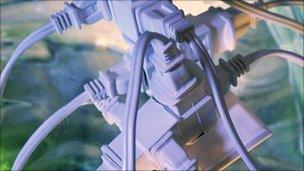Europe targets wasteful gadgets
- Published

The Steeper project wants to make gadgets far less power hungry.
Wasteful gadgets could soon be a thing of the past thanks to European research into less power hungry devices.
Called Steeper, the project's goal is to make gadgets 10 times more efficient when in use and almost eliminate energy consumption when idle.
It is looking into ways to produce more efficient transistors - the building blocks of many digital devices.
Nanotech, novel materials and manufacturing methods are all targets for the researchers.
Steeper is being co-ordinated by the Ecole Polytechnique Federale de Lausanne and gets its name from the novel transistors it is focussing on.
Steep slope transistors get their name because of the abrupt change they exhibit when switching between on and off states. If the research teams succeed in their aim of making such devices they would use far less power than existing transistor designs which typically leak energy even when supposedly turned off.
This inefficiency contributes to the growing amount of energy lost when gadgets and household appliances are put into standby mode.
About 10% of all the energy used in homes and offices across the EC is sucked up by appliances in standby mode, suggests research by the Commission's Joint Research Center.
If this grows unchecked, suggests the JRC, by 2020 the energy consumed by devices in standby or off mode will grow to 49 terrawatt hours per year - roughly equivalent to the current annual energy needs of Austria, the Czech Republic and Portugal combined.
"Our vision is to share this research to enable manufacturers to build the Holy Grail in electronics, a computer that utilizes negligible energy when it's in sleep mode, which we call the zero-watt PC," said Professor Adrian Ionescu from the Nanolab at the Ecole Polytechnique Federale de Lausanne in a statement.
- Published5 October 2010
- Published2 September 2010
- Published24 May 2010